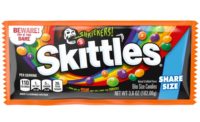Mars Wrigley and Danimer Scientific, developer and manufacturer of biodegradable materials, have entered a two-year partnership to develop home compostable packaging.
Mars Wrigley will leverage its global portfolio of treats and snacks to enable consumers to compost at home, working together with consumers and supply-chain partners to support a healthy planet. The first brand Mars Wrigley will introduce with the compostable packaging in the U.S. will be Skittles.
"The impact of plastic on nature is one of the major sustainability challenges of our generation. There are no simple solutions and transformational innovation is necessary, we have to think and act differently," said Alastair Child, Mars Wrigley v.p. of global sustainability. "Collaborating with Danimer to advance this breakthrough technology represents a major step to creating positive societal impact and better environmental outcomes across the full lifecycle of small, flexible packaging."
Danimer Scientific's signature packaging — Nodax polyhydroxyalkanoate (PHA) — is produced through natural fermentation processes using plant oils such as soy and canola and biodegrades in both soil and marine environments. Mars will continue to evaluate opportunities to scale this sustainable packaging technology across its portfolio of brands and categories.
Danimer Scientific and Mars Wrigley plan to introduce Nodax PHA into flexible and rigid packaging that reliably breaks down in both industrial composting facilities and backyard compost units. Sourced from the seeds of plants such as canola and soy, Nodax PHA can serve as an alternative to traditional petrochemical plastic. In addition to better end-of-life options, Nodax PHA is renewably sourced, making it a truly circular material that helps eliminate waste.
Mars Wrigley's Purpose includes a connected supply chain that cares for the planet and supports Mars' Sustainable in a Generation plan. The joint development agreement is a key component of Mars Wrigley's comprehensive strategy to transform its packaging portfolio to support a circular economy and to drive progress against its goal of 100 percent reusable, recyclable or compostable packaging by 2025.
For Mars Wrigley, collaborating with Danimer Scientific represents a step change for its packaging sustainability strategy and brings the business closer to its vision for a circular economy where no packaging becomes waste. As part of Mars, Incorporated's $1B Sustainable in a Generation Plan to help create a healthier planet, Mars Wrigley is testing a range of material solutions in markets around the world, such as mono material and paper-based alternatives, to make incremental progress toward its goals.
The aim of this collaboration is new, biodegradable packaging for various Mars Wrigley brands, starting with smaller and single packs that are more likely to be littered and typically less likely to be recycled. Mars Wrigley is leaning into this problem by creating new-to-world packs for a wide range of formats. Initial development work will kick off in North America with the goal of reaching additional markets with underdeveloped recycling infrastructures where littering and leakage into nature are especially problematic. Mars Wrigley's first on-the-shelf offerings are tentatively targeted for late 2021 or early 2022, featuring its Skittles brand in the U.S.
"Expectations for sustainable packaging vary from market to market, making it essential for new materials to be adaptable in meeting different standards without sacrificing quality," said Stephen Croskrey, CEO at Danimer Scientific. "PHA provides a versatile platform for manufacturing material that is renewably sourced and leaves a minimal impact on the environment upon disposal. We look forward to working with Mars Wrigley in fighting the global crisis of plastic waste."




